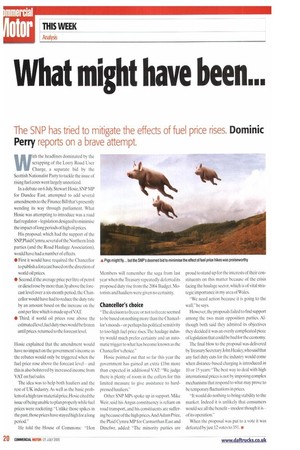What might have been...
Page 20

If you've noticed an error in this article please click here to report it so we can fix it.
The SNP has tried to mitigate the effects of fuel price rises. Dominic
Perry reports on a brave attempt.
With the headlines dominated by the scrapping of the Lorry Road User Charge, a separate bid by the Scottish Nationalist Party to tackle the issue of rising fuel costs went largely unnoticed.
In a debate on 6 July, Stewart Hosie, SNP MP for Dundee East, attempted to add several amendments to the Finance Bill that's presently wending its way through parliament. What Hosie was attempting to introduce was a road fuel regulator— legislation designed to minimise the impact of long periods of high oil prices His proposal, which had the support of the SNP, Plaid Cymru,several of the Northern Irish parties (and the Road Haulage Association), would have had a number of effects, • First it would have required the Chancellor to publish a forecast based on the direction of world oil prices.
• Second. if the average price per Litre of petrol or diesel rose by more than 3p above the forecast level over a six-month period, the Chancellor would have had to reduce the duty rate by an amount based on the increase on the cost per litre which is made up of VAT.
• Third, if world oil prices rose above the estimated level,fuel duty rises would be frozen until prices returned to the forecast level.
Hosie explained that the amendment would have no impact on the government's income as the rebates would only be triggered when the fuel price rose above the forecast level — and this is also bolstered by increased income from VAT on fuel sales.
The idea was to help both hauliers and the rest of UK industry. As well as the basic problem of a high raw material price,Hosie cited the issue of being unable to plan properly while fuel prices were rocketing: "Unlike those spikes in the past, those prices have stayed high for along period."
He told the House of Commons: "Hon Members will remember the saga from last year when the Treasury repeatedly deferred its proposed duty rise from the 2004 Budget. Motorists and hauliers were given no certainty.
Chancellor's choice ""lhe decision to freeze or not to freeze seemed to be based on nothing more than the Chancellor's moods—or perhaps his political sensitivity to too-high fuel price rises. The haulage industry would much prefer certainty and an automatic trigger to what has become known as the Chancellor's choice."
Hosie pointed out that so far this year the government has gained an extra ilbn more than expected in additional VAT: "We judge there is plenty of room in the coffers for this limited measure to give assistance to hardpressed hauliers."
Other SNP MPs spoke up in support. Mike Weir, said his Angus constituency is reliant on road transport, and his constituents are suffering because of the high prices.And Adam Price, the Plaid Cymru MP for Carmarthan East and Dinefwr, added: "The minority parties are proud to stand up for the interests of their constituents on this matter because of the crisis facing the haulage sector, which is of vital strategic importance in my area of Wales.
"We need action because it is going to the wall." he says.
However, the proposals failed to find support among the two main opposition parties. Although both said they admired its objectives they decided it was an overly complicated piece of legislation that could be bad for the economy.
The final blow to the proposal was delivered byTreasury Secretary John Healey,who said that any fuel duty cuts for the industry would come when distance-based charging is introduced in 10 or 15 years: "The best way to deal with high international prices is not by imposing complex mechanisms that respond to what may prove to be temporary fluctuations in prices.
"It would do nothing to bring stability to the market. Indeed it is unlikely that consumers would see all the benefit — modest though it is— of its operation."
When the proposal was put to a vote it was defeated by just 12 votes to 351


































































































































































































